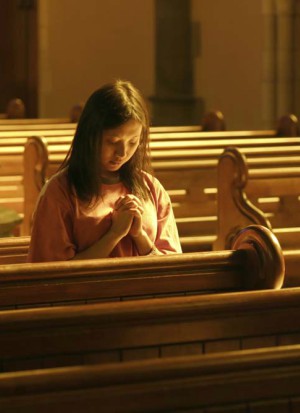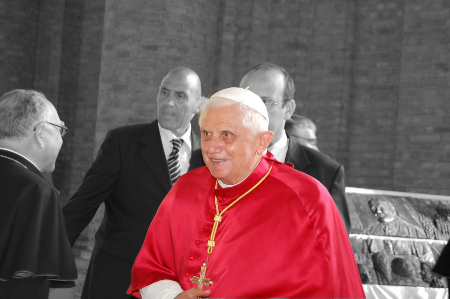We ask you, humbly: don't scroll away.
Hi readers, it seems you use Catholic Online a lot; that's great! It's a little awkward to ask, but we need your help. If you have already donated, we sincerely thank you. We're not salespeople, but we depend on donations averaging $14.76 and fewer than 1% of readers give. If you donate just $5.00, the price of your coffee, Catholic Online School could keep thriving. Thank you.Help Now >
Weeding Out Corruption
FREE Catholic Classes
Vatican Document Highlights the Problems
By Father John Flynn
ROME, OCT. 30, 2006 (Zenit) - A recent Vatican document summarized some of the lessons learned about the problem of corruption. On Oct. 4 the Pontifical Council for Justice and Peace published a note entitled "The Fight Against Corruption."
The note follows a symposium held June 2-3 in the Vatican, where high-level representatives of international organizations, together with scholars and diplomats, discussed the ravages of corruption with Holy See officials.
Corruption has always existed, the note acknowledges, but in recent years it is drawing greater attention and action. There is also a growing awareness of the damage it causes, both for richer nations and developing countries. This process was stimulated by the end of ideological divisions following the fall of the Berlin Wall in 1989, and the increased flow of information due to globalization.
Calculating precisely the level of corruption is difficult, and estimates vary widely. "Nonetheless," the note comments, "we are dealing with enormous amounts of resources that are taken away from the economy, from production and from social programs" (No. 3).
The Vatican document observes that the phenomenon of corruption is not limited by politics or geography. As well, it is prevalent in all areas of society, not just among public officials or the business sector.
Among the factors facilitating corruption is a lack of transparency in international finances, with the corrupt being able to make use of financial havens. In addition, the lack of cooperation among states, and the differences in their legal systems, complicates matters. In some countries the lack of a free press, or a well-functioning democracy, means that corruption is easier to get away with.
Corruption is also connected with other criminal activities, such as drug trafficking, money laundering, and the illegal trade in arms.
In addition to the monetary costs the Pontifical Council for Justice and Peace highlighted other negative effects of corruption. Citing the Compendium of the Social Doctrine of the Church (No. 411), the pontifical council observed that political corruption "compromises the correct functioning of the state, having a negative influence on the relationship between those who govern and the governed." This leads to distrust of public institutions, and their subsequent weakening.
High levels of corruption are also associated with a lack of development and social injustices. "This is not merely a process that weakens the economic system," the note concluded. "Corruption hinders the promotion of the person and makes societies less just and less open" (No. 4).
Moral judgment
The Church considers corruption a serious moral problem. Again citing the social-doctrine compendium, the Vatican note observes that corruption distorts the functioning of political institutions and damages their ability to ensure the common good of all citizens. Corruption also destroys the legal systems and undermines the trust needed in order for society and economic activity to function well.
Corruption, the note explains, "exploits the human person, disdainfully using men and women for selfish interests." Moreover, "It represents an obstacle for achieving the common good, because it is based on individualistic criteria of selfish cynicism and illicit special interests" (No. 8).
As well, corruption contradicts solidarity, because it gives rise to injustice and poverty. And it harms the poor, by distorting the distribution of resources intended for them.
In fighting against corruption, a strong and open democratic system can be an advantage, as rigid or closed systems can stimulate bribery and other means to circumvent inflexibilities. But the Vatican note expresses concern over advanced democratic societies that suffer a breakdown in moral standards.
An excessive pluralism in modern democratic states can lead to a lack of consensus on ethical standards. And widely differing lifestyles can undermine the capacity to formulate moral judgments.
To counteract these dangers the Church proposes what it terms a "human ecology." This concept was set out by Pope John Paul II in his encyclical "Centesimus Annus." Corruption can be conceived of as a breakdown in human ecology, which occurs when families do not transmit moral values, when laws are unjust, and when social conditions deteriorate.
Promoting an adequate human ecology involves the moral formation and education for all citizens, a task which the Church is well placed to carry out. The Church can also help through communicating its social doctrine. The application of principles such as the dignity of the human person, the common good, and solidarity can be of great assistance in struggling against corruption.
"The whole of the Church's social doctrine proposes a perspective of social relationships that is completely at odds with the practice of corruption," the note comments (No. 8).
The Vatican document further recommends more attention to the moral struggle that takes place within each person. Reducing corruption will be easier if citizens cultivate virtuous behavior and see the fight against bribery and other corrupt practices as part of that task.
Practical measures
The note recognizes that many political and legal measures are needed in order to reduce corruption. Steps include publicly exposing illicit behavior, punishing the guilty, and establishing ethical codes.
At the international level, there needs to be greater transparency in economic and financial transactions and a move to uniformity of legislation. The note also recommends more cooperation between governments in extraditing criminals, given the international nature of organized crime.
These efforts can be assisted by international conventions, but they need to be actively implemented by all countries. Poor countries require help in fighting against corruption as their legal systems are often inadequate. Attention is also required to avoid corruption resulting from the activities of international companies or agencies in underdeveloped countries.
The extent of this problem was highlighted in a report published by Transparency International on the same day the Vatican note came out. The Berlin-based organization released a report detailing the bribes paid by companies from wealthy countries.
The "2006 Bribe Payers Index" examined the propensity of companies from 30 leading exporting countries to bribe abroad. Companies from the wealthiest countries routinely pay bribes, particularly in developing economies. Even so, businesses based in developed nations are at the lower end of scale in terms of the magnitude of paying bribes. Companies from countries such as India, China, Russia and Turkey are the worst offenders.
The results are based on responses of more than 11,000 business people in 125 countries, polled in the World Economic Forum's Executive Opinion Survey 2006.
"Bribing companies are actively undermining the best efforts of governments in developing nations to improve governance, and thereby driving the vicious cycle of poverty," said Transparency International Chair Huguette Labelle.
Reducing bribery by companies from wealthier countries has been helped by the Organization for Economic Cooperation and Development's Anti-Bribery Convention. But OECD membership does not extend to developing nations, meaning that nations such as China, India and Russia remain outside the treaty.
The Vatican note concludes by recommending the part local churches can play in fighting against corruption by helping to form a civil conscience and in promoting a society governed by law. They will have plenty of work to do.
Contact
Catholic Online
https://www.catholic.org
CA, US
Catholic Online - Publisher, 661 869-1000
info@yourcatholicvoice.org
Keywords
Corruption, Vatican, Flynn, Justice, Peace
 Hi readers, it seems you use Catholic Online a lot; that's great! It's a little awkward to ask, but we need your help. If you have already donated, we sincerely thank you. We're not salespeople, but we depend on donations averaging $14.76 and fewer than 1% of readers give. If you donate just $5.00, the price of your coffee, Catholic Online School could keep thriving. Thank you. Help Now >
Hi readers, it seems you use Catholic Online a lot; that's great! It's a little awkward to ask, but we need your help. If you have already donated, we sincerely thank you. We're not salespeople, but we depend on donations averaging $14.76 and fewer than 1% of readers give. If you donate just $5.00, the price of your coffee, Catholic Online School could keep thriving. Thank you. Help Now >
More Catholic PRWire
Showing 1 - 50 of 4,716
A Recession Antidote
Randy Hain
Monaco & The Vatican: Monaco's Grace Kelly Exhibit to Rome--A Review of Monegasque-Holy See Diplomatic History
Dna. Maria St. Catherine Sharpe, t.o.s.m., T.O.SS.T.
The Why of Jesus' Death: A Pauline Perspective
Jerom Paul
A Royal Betrayal: Catholic Monaco Liberalizes Abortion
Dna. Maria St.Catherine De Grace Sharpe, t.o.s.m., T.O.SS.T.
Embrace every moment as sacred time
Mary Regina Morrell
My Dad
JoMarie Grinkiewicz
Letting go is simple wisdom with divine potential
Mary Regina Morrell
Father Lombardi's Address on Catholic Media
Catholic Online
Pope's Words to Pontifical Latin American College
Catholic Online
Prelate: Genetics Needs a Conscience
Catholic Online
State Aid for Catholic Schools: Help or Hindrance?
Catholic Online
Scorsese Planning Movie on Japanese Martyrs
Catholic Online
2 Nuns Kidnapped in Kenya Set Free
Catholic Online
Holy See-Israel Negotiation Moves Forward
Catholic Online
Franchising to Evangelize
Catholic Online
Catholics Decry Anti-Christianity in Israel
Catholic Online
Pope and Gordon Brown Meet About Development Aid
Catholic Online
Pontiff Backs Latin America's Continental Mission
Catholic Online
Cardinal Warns Against Anti-Catholic Education
Catholic Online
Full Circle
Robert Gieb
Three words to a deeper faith
Paul Sposite
Relections for Lent 2009
chris anthony
Wisdom lies beyond the surface of life
Mary Regina Morrell
World Food Program Director on Lent
Catholic Online
Moral Clarity
DAN SHEA
Pope's Lenten Message for 2009
Catholic Online
A Prayer for Monaco: Remembering the Faith Legacy of Prince Rainier III & Princess Grace and Contemplating the Moral Challenges of Prince Albert II
Dna. Maria St. Catherine Sharpe
Keeping a Lid on Permissiveness
Sally Connolly
Glimpse of Me
Sarah Reinhard
The 3 stages of life
Michele Szekely
Sex and the Married Woman
Cheryl Dickow
A Catholic Woman Returns to the Church
Cheryl Dickow
Modernity & Morality
Dan Shea
Just a Minute
Sarah Reinhard
Catholic identity ... triumphant reemergence!
Hugh McNichol
Edging God Out
Paul Sposite
Burying a St. Joseph Statue
Cheryl Dickow
George Bush Speaks on Papal Visit
Catholic Online
Sometimes moving forward means moving the canoe
Mary Regina Morrell
Action Changes Things: Teaching our Kids about Community Service
Lisa Hendey
Easter... A Way of Life
Paul Spoisite
Papal initiative...peace and harmony!
Hugh McNichol
Proclaim the mysteries of the Resurrection!
Hugh McNichol
Jerusalem Patriarch's Easter Message
Catholic Online
Good Friday Sermon of Father Cantalamessa
Catholic Online
Papal Address at the End of the Way of the Cross
Catholic Online
Cardinal Zen's Meditations for Via Crucis
Catholic Online
Interview With Vatican Aide on Jewish-Catholic Relations
Catholic Online
Pope Benedict XVI On the Easter Triduum
Catholic Online
Holy Saturday...anticipation!
Hugh McNichol












 Daily Readings for Thursday, April 18, 2024
Daily Readings for Thursday, April 18, 2024 St. Apollonius the Apologist: Saint of the Day for Thursday, April 18, 2024
St. Apollonius the Apologist: Saint of the Day for Thursday, April 18, 2024 Aspiration: Prayer of the Day for Thursday, April 18, 2024
Aspiration: Prayer of the Day for Thursday, April 18, 2024


